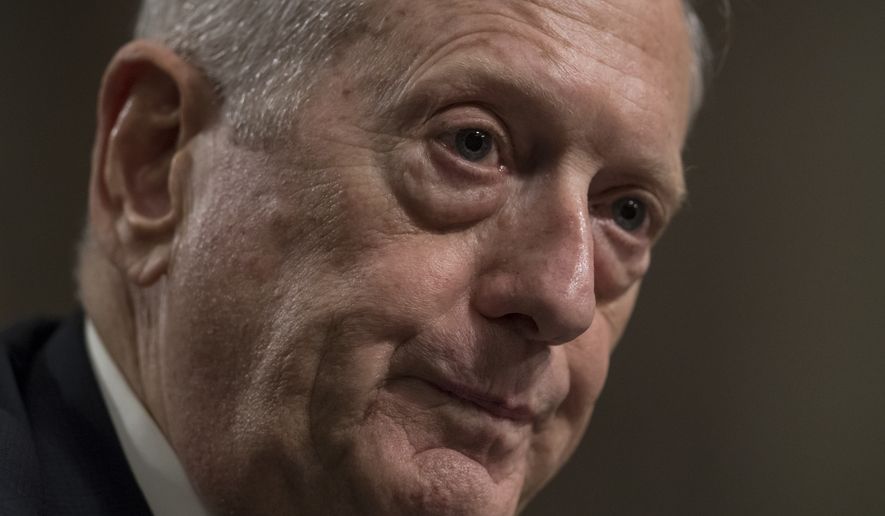Defense Secretary-nominee James Mattis became the latest of President-elect Donald Trump’s picks to break with his boss’ campaign rhetoric, saying at his Senate confirmation hearing Thursday that he believed Russia was trying to break the NATO alliance and rejecting the use of torture on terrorist suspects.
But the retired Marine general and former head of U.S. Central Command did signal that he favored a tougher line on Iran than the outgoing Obama administration and cleared a major hurdle to his nomination when the Senate overwhelmingly approved a waiver to a law that prohibits recently retired military officers from leading the Pentagon.
The 81-17 Senate vote capped what appeared to be a highly successful day on Capitol Hill for the former four-star general. Questioning from Democrats and Republicans suggested he faced a relatively easy path to confirmation.
The House Armed Services Committee backed the waiver in a 34-28 vote, and the full House is expected to do the same on Friday. The committee approval was narrow because some House Democrats complained that the waiver measure was rushed after a planned hearing was canceled.
Although Gen. Mattis largely drew praise from members of the Senate Armed Services Committee, the picture he painted of the myriad threats facing the United States was markedly different at times from that outlined by Mr. Trump, particularly on the strategic threat posed by Russia.
In his testimony and answers, Gen. Mattis laid plain what he said were the corrosive effects Russia was having on Western interests and the need for a strong NATO alliance to contain Moscow’s ambitions.
The relative peace of the post-Cold War era is “under the biggest attack since World War II, sir, and that’s from Russia, from terrorist groups and with what China is doing in the South China Sea,” Gen. Mattis told the panel.
Russian President Vladimir Putin is “trying to break the North Atlantic alliance,” he said.
Russia’s overall military aggressiveness on the world stage, in places such as Crimea and the Black Sea, has severely limited Washington’s diplomatic options to engage with the country, the nominee said.
“We should always engage and look for areas of cooperation … but we also have to recognize reality and what Russia is up to, and there’s a decreasing number of areas where we can engage cooperatively and an increasing number of areas where we’re going to have to confront Russia.”
That hard line is a far cry from the stance taken by Mr. Trump, who told reporters Wednesday that “if Putin likes me, I consider that an asset, not a liability.”
But the nominee’s testimony appeared to reassure Armed Services Committee Chairman John McCain of Arizona, a leading Republican hawk who has criticized Mr. Trump’s softer approach toward Russia.
“I’ve watched three presidents commit themselves to new relationships with Vladimir Putin. All three have been an abysmal failure,” Mr. McCain said.
Gen. Mattis also suggested that the Trump administration will not move to scuttle the nuclear deal negotiated by Iran with the U.S. and five other world powers.
Although he was an outspoken critic of the deal before it was signed, Gen. Mattis told lawmakers, he was opposed to killing the deal outright now that it was in force.
“I think it is an imperfect arms control agreement. It’s not a friendship treaty,” Gen. Mattis said. “But when America gives her word, we have to live up to it and work with our allies.”
The Iran deal brokered by President Obama was a favorite target of Mr. Trump on the campaign trail. While candidate Trump brashly condemned the nuclear pact, he left it unclear whether he would scrap the deal, demand major revisions or simply seek to enforce its provisions so tightly that Iran would likely balk.
On cyberattacks, the general said, wars often are started by miscalculation. He said the U.S. needs to set clear boundaries so that adversaries know what will not be tolerated.
Gen. Mattis also expressed support for a two-state solution as a cornerstone for any Israeli-Palestinian peace plan.
“If that brings peace to the Middle East, I’m eager to see it work. If there’s another solution, I’d be happy to hear what it is,” he said while noting that “there’s nothing easy about the two-state solution.”
The general is set to take over the Pentagon at a time of extraordinary challenge, with the U.S. military still in the field in Iraq, Syria and Afghanistan, China on the rise in Asia and North Korea defying the U.S. and the international community by proceeding with an aggressive nuclear arms program. In addition, he will be overseeing a massive budget as Mr. Trump promises a major military buildup while dealing with such issues as contractor policy and women and gays in the ranks.
“We see each day a world awash in change,” Gen. Mattis said. “Our country is still at war in Afghanistan, and our troops are fighting against ISIS and other terrorist groups in the Middle East and elsewhere. Russia is raising grave concerns on several fronts, and China is shredding trust along its periphery.”
⦁ This article is based in part on wire service reports.
• Carlo Muñoz can be reached at cmunoz@washingtontimes.com.




Please read our comment policy before commenting.